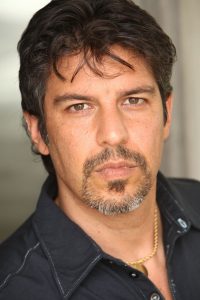“It’s like [in] Monty Python where they keep cutting off limbs – there are less and less resources to do my job.” And so, while referencing the Black Knight from Monty Python and the Holy Grail, MPSE President Mark A. Lanza neatly encapsulates the circumstances that those motion picture (and TV) sound editors who are still working face: Even for shows that ostensibly remain “in production” during this season of twin strikes and tropical storms, as it turns out, you can’t do a lot of post-production when your acting leads can’t come to the mixing stage. And even if they could, you can’t get WGA scribes to change or write additional lines for those sessions. “Even the loop groups are SAG,” he points out.
And again, those are the conditions for sound editors who’ve managed to hang on to work. Never mind those who haven’t had any for weeks on end. All of which occasioned MPSE’s recent announcement that “the board of the Motion Picture Sound Editors has voted unanimously to waive dues payments for its members for the current year. As with other below-the-line talent, sound editors have been profoundly impacted by the stoppage of film and television production. The board is making this gesture in support of its members, many of whom are currently out of work, and to help them avoid having to make the difficult choice of maintaining their membership while experiencing economic hardship.”
Lanza noted that with the new fiscal year rolling around in July, “we had a higher than normal amount of people that weren’t paying their dues,” because of the hardships imposed by the strike. The board was searching for ways to make deadlines and dues-paying easier, when suddenly, Lanza thought “in the middle of that – why do any of that at all?” So he put forward the proposal to “waive the dues for everybody.”
“At first,” he recounts, “everyone (on the board) looked stunned.” But this way, he explained, “people don’t have to make a choice,” and possibly forgo things like MPSE’s “Sound Advice” events, or even the annual picnic coming up in October. Which, if the current feints, parries, and can-we-call-them-negotiations-yet? between the AMPTP and WGA can lead to an autumn conclusion for one or both strikes, could also be a somewhat critical event for back-to-work networking. Perhaps even more so if the strike isn’t over.

Indeed, Lanza recalls what brought him into sound editing originally – finding a job that allowed him to marry both his “computer knowledge and artistic endeavors. The lure was too much.”
As it remains for so many now scrambling for work, trying to figure out mortgage or rent payments, getting kids back-to-school, and putting groceries on the table, even if the original impetus for working above and/or below the line was that “we just love to make movies – that’s what everyone in the industry (wants),” to simply be, Lanza emphasizes, a part of the culture telling stories to, and about, itself.
Of course, as far as electronic stories-in-motion go, movies were long ago joined by television – as the difference between the two continues to narrow (Barbenheimer weekends notwithstanding). And those two platforms have been joined, for nearly a couple generations now, by video gaming, as another culturally pervasive source of stories, characters, and collective self-reflection (what could all those apocalyptic settings tell us about ourselves?)
On which note, given our protracted “pre-Emmy award” season, we caught up with Timothy A. Good, ACE, who –speaking of editors – is nominated in the “Outstanding Picture Editing for a Drama Series” category for his work on The Last of Us.
We asked him what story “pacing” was like, in a series derived from a renowned video game franchise – a platform with a generally more frenetically paced stories than its predecessors, though again, each keeps informing and affecting the other, over time.
His reply, though, was that “the pacing in The Last of Us was not determined by the game, but by the performances and shot decisions made by the actors and directors, and by the fact that since I had never played the game, I was not trying to replicate any sort of pacing that might have existed before. Each scene was thus edited to illuminate the story and emotions that were happening between each character and the desire to allow the audience to really connect with their needs and feelings.”
This also meant some very non-gameplay type decisions like creating “additional tension in the extended silences between Bill and Frank sussing each other out,” or even using Altmanesque “overlapping dialogue in an argument between Joel and Ellie when they first meet to highlight their equality,” along with such “modern tools of post production such as fluid morph and split screening to create a comedic pace between the native couple and Joel and Ellie without being forced into overcutting to create that pace.”
However, Good also found that “what ultimately happened over time is that the pacing we were working with was starting to dovetail with the pacing of the game near the conclusion. When I edited the final scene of the season having no knowledge of the scene from the game, I compared the two and realized that I had come to almost exactly the same decisions that the game did. So in the end, the pace was dictated by our values to spotlight the character arcs of Joel and Ellie, and a desire to make each edit mean something.”

Joel and Ellie, of course, being the leads played by the also-Emmy nominated Pedro Pascal and Bella Ramsey, and Bill and Frank being the also nominated Nick Offerman and Murray Bartlett characters from the highly touted Long, Long Time episode. Good’s nomination, however, is for the subsequent Endure and Survive installment.
But one area where video game pacing is very slow indeed is, according to Lanza, the length of time that sound personnel work on them, including those MPSE members who come from the gaming side. After all, he notes, each game’s “effects are massive – there are so many changes. The monsters change – everything changes,” along with music cues, sound effects, and dialogue, during the course of the game’s creation.
And generally, he observes, that while “some people might go back and forth,” between video games and other media, generally, “if you get on a game, you’re there for three years,” the tradeoff being that “you lose a lot of your contacts” in the meantime, when you re-emerge looking for new work.
But that probably doesn’t seem too bad to a lot of people right now, when they don’t have any work at all, since the whole town is still waiting for the current “strike impasse boss” to finally be defeated on this particular level of real-life gameplay.
Whether any real advances have been made – or whether characters will simply need to reboot themselves and start over – will become clearer as we head more fully into hurricane season.
 Mark London Williams is a BTL alum who currently covers Hollywood and its contents and discontents in his recurring “Across the Pond” dispatch for British Cinematographer magazine, contributes to other showbiz and production-minded sites, and musters out the occasional zombie, pandemic-themed, or demon-tinged book and script, causing an increased blurring in terms of what still feels like “fiction.”
Mark London Williams is a BTL alum who currently covers Hollywood and its contents and discontents in his recurring “Across the Pond” dispatch for British Cinematographer magazine, contributes to other showbiz and production-minded sites, and musters out the occasional zombie, pandemic-themed, or demon-tinged book and script, causing an increased blurring in terms of what still feels like “fiction.”
Mark’s Union Roundup column will appear regularly, and he welcomes both tips and feedback at [email protected]. He can also be found on Twitter @TricksterInk.






